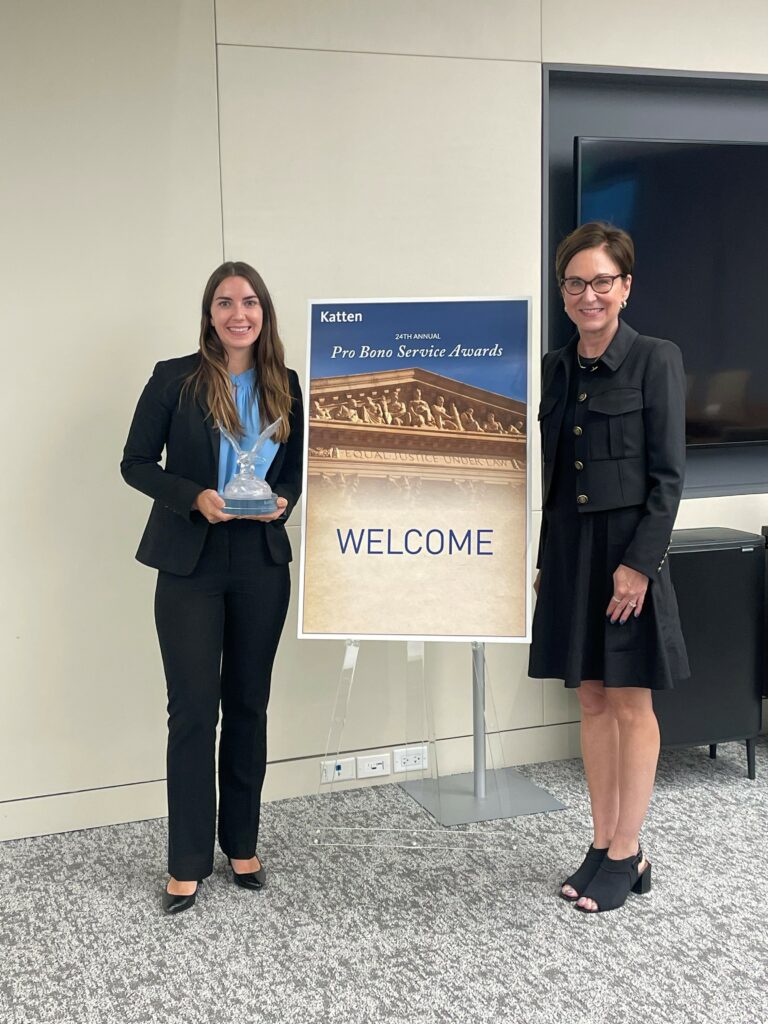(Publisher’s Note: Katten is a sponsor of The Lawbook’s Corporate Deal Tracker page. This Q&A is an associated thought leadership piece.)
(Editor’s Note: Minor edits have been made for brevity and to match style guidelines.)
From researching Texas anti-cruelty statutes to setting up a new nonprofit to donating eyeglasses to schoolchildren and adults in need, Katten Muchin Rosenman’s Dallas office had a well-rounded year for pro bono work.
The Chicago firm also recently recognized 13 of its attorneys for standout pro bono work in 2023 during its Annual Pro Bono Service Awards. One of the honorees is based in Texas: Dallas white collar associate Grace Caputo.
Caputo was recognized for her work that helped secure asylum for a mother and her two young children fleeing gang violence in El Salvador.
In a twin set of Q&A’s below, Caputo elaborates on the asylum case (which also involved a high-up lawyer at the world’s largest fast food chain) and what else she’s been working on pro bono-wise while Katten Dallas office managing partner Mark Solomon explains why Caputo was selected for the award, why her work aligned with the firm’s values and other pro bono endeavors Katten Dallas had up its sleeve in 2023.
Part I
Texas Lawbook: Tell me more about the case — the facts, the outcome and how you/the firm got involved.

Grace Caputo: Heartland Alliance in Chicago referred the asylum case to Katten. The firm was fortunate to partner with McDonald’s Corporate Vice President and Associate General Counsel Denise Horne on this matter. The case involved a woman and her two young children who fled El Salvador after she endured years of physical and psychological abuse at the hands of her long-time domestic partner and father of her children. Her partner was not a gang member when they started dating, but he later joined the notorious Mara-18 gang. After he was imprisoned for murder, Mara-18 members, at his direction, allegedly stalked her and threatened to kill her and kidnap her children. At our merits hearing, we received an extraordinary outcome when the judge ruled on the bench in our favor and granted asylum to our client and her two children prompting the government to waive its right to appeal. It was an amazing result, especially since this happened during my first year practicing law.
Lawbook: How was this case personally meaningful for you, and how was it significant to your client or in a larger context?
Caputo: It has always been important for me to help people in any way I can. It is the No. 1 reason I wanted to become a lawyer. It was also meaningful for me, as a woman, to stand up against domestic violence and machismo culture. For my client and her two children, they can now live a completely different life —one where they feel safe and free from fear and gang violence.
Lawbook: Have you handled any other pro bono matters in your career, and if so, can you please describe them?
Caputo: I am currently working on another asylum case with a man from Ghana who fled his country because he was being persecuted by his family and community for identifying as gay. Last year, I worked on an election fraud case that was highly politically motivated. I am also working on a case with the Federal Public Defender’s Office in Washington, D.C., that involves the Arms Export Control Act.

Lawbook: Why should more young attorneys consider stepping up to handle pro bono work?
Caputo: I think it’s important for everyone to give back to their community. As an attorney, I feel it is my duty to take on pro bono work. Nothing feels better than knowing you have improved someone’s life. Beyond that, it is an amazing opportunity to get hands on experience at an early stage in your career. It is also a great opportunity to network and collaborate. When I received my Katten pro bono award, Denise was kind enough to travel from Chicago to give remarks at the Katten pro bono awards ceremony about what we accomplished together. We still keep in touch to this day.
Part II
Texas Lawbook: Why was Grace selected for this award?
Mark Solomon: Grace received a Katten Pro Bono Service Award because she exemplifies outstanding pro bono service and ongoing dedication to supporting those in need. Her efforts to secure asylum for a mother and her two young children fleeing gang violence demonstrated real change and positively impacted the lives of the people she was serving, which is something we look for when honoring attorneys with this award. In addition to immigration matters, Grace is passionate about criminal justice, specifically related to fighting against the death penalty.
Lawbook: How did this pro bono case and Grace’s work on it fit into the firm’s values?

Solomon: At Katten, our pro bono work centers around providing high-quality legal services to benefit others, especially the most vulnerable who need an advocate but can’t afford to pay for it. Our attorneys, like Grace, give the same attention to pro bono clients as our corporate clients and treat them with respect, dignity and kindness that they deserve. Grace’s ongoing work on a variety of asylum cases reflect the firm’s dedication to helping others like struggling refugees. In college, Grace demonstrated a long-term desire to help others in need when she majored in human rights at SMU and, as part of that program, provided community service at the International Rescue Committee in Dallas. Grace has made it clear that her pro bono service is a lifelong commitment and passion.
Lawbook: What’s in the pipeline pro bono-wise for Katten’s Dallas office?
Solomon: In addition to Grace’s exceptional work, last year we had several impactful pro bono projects led by Dallas attorneys of which we are equally proud. For instance, a team of Katten attorneys helped the Jewish Family Service of Greater Dallas establish a medical clinic to expand its services to uninsured, underserved, and unemployed individuals in the North Texas community. We also had attorney research for Animal Partisan on Texas anti-cruelty statutes for farmed animals to explore potential avenues to address animal cruelty in Texas, as well as a group of attorneys and summer associates who held a diaper drive for the Hope Supply Co. Another attorney helped organizers form the nonprofit Food for the Cities, based in Rowlett, and successfully apply for 501(c)(3) tax exempt status, enabling the organization to access new donor sources, as well as allow donors to get federal tax deductions for their donations to the organization, which provides the homeless, teachers and students at low-income schools, and others in need with food, education support and supplies. Additionally, in a project spearheaded by the Community Involvement Committee of the Dallas Bar Association, 150 pairs of eyeglasses were delivered to the Dallas Founder Lions Club, which provides eyeglasses to schoolchildren and needy adults. As you can tell, Katten handles a range of pro bono work. But no matter the project, I’m certain they were all rewarding experiences for our attorneys.
